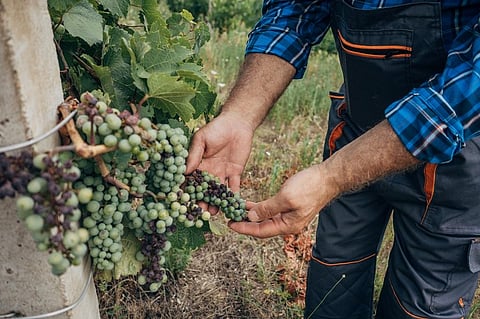

The unseasonal rains and hailstorms in early March 2023 wiped out nearly 50,000 acres of vineyards in Maharashtra, according to Grape Growers Association. The extreme weather conditions that began on March 4 subsided around March 18, resulting in heavy losses to the farmers.
Maharashtra is a leading producer of grapes among the grape-growing states of Karnataka, Tamil Nadu, Mizoram and Andhra Pradesh. Grapes grown in Maharashtra contribute to about 71 per cent of the total production, according to government statistics.
Over 0.1 million farmer families in the state have been affected by the rains and hailstorms that lasted for over ten days in different parts of Maharashtra, Kailas Bhosle, deputy president of the Grape Growers Association, told Down To Earth.
“In Maharashtra, Pune, Sangli, Solapur and Nashik are the four major grape growing divisions. Of these regions, Nashik suffered major damage. An average of about 0.4 million acres of land here is under grape cultivation, of which over 10 per cent is affected,” he said.
It is estimated that about 40,000 to 50,000 acres of grape cultivation have been affected, Bhosle said. “The government officials have initiated the assessment, but these are the primary figures. The extent of damage is usually seen about a week after the extreme weather event. Hence, more losses are expected,” he added.
Ramdas Patil, a grape farmer from Nilwande, Ahmednagar district, told DTE:
The extreme change in weather causes the grapefruit to crack or lose water. It drastically reduces its shelf life and limits the produce meant for export to the local markets.
Bhosle said the deteriorating quality of grapes has resulted in a drop in export by almost 25 per cent. “For the past 10 days, the export has completely halted as the farmers have been trying to save their produce. Though the export season will continue until April, more rough weather is predicted and it may add to the damages,” he said.
The association’s deputy president informed that a meeting was held with the government officials and ministers to chalk out a relief plan for the farmers.
Patil said the deteriorating quality alternatively forces farmers to make raisins out of them to reduce the losses. “I have suffered a loss of Rs 5 lakh, but I am hoping to recover from it as I had managed to harvest 90 per cent of my grapes from the plots spread across nine acres,” he said.
However, not all farmers could manage to save their crops. Ganesh Kadam from Mohadi in Nashik, about 100 km from Nilwande, has suffered a loss of at least 20 per cent. “Of the 12 acres of land used for grape cultivation, two acres of cultivation has entirely been wiped out,” he said.
Kadam said he expected revenue of about Rs 11 lakh from the damaged crop, which has now reduced to about Rs 4 lakh. “I have invested Rs 75 lakh and an additional Rs 10 lakh on insecticides and pesticides this year. My income will drastically reduce to Rs 55 lakh if no further damage occurs. Even that will not cover the cost invested in,” he explained.
He added that not exporting the grapes and selling them in the domestic market is not profitable. “The grapes, which are usually sold at Rs 35-40 per kilogram, are fetching Rs 10-15 per kg due to its poor quality. Farmers are mixing good and poor quality grapes to recover from the losses, but it will not help much,” he said.
The true extent of damage can only be assessed after the estimates from the government are released, and assistance will be demanded accordingly, Bhosle said.